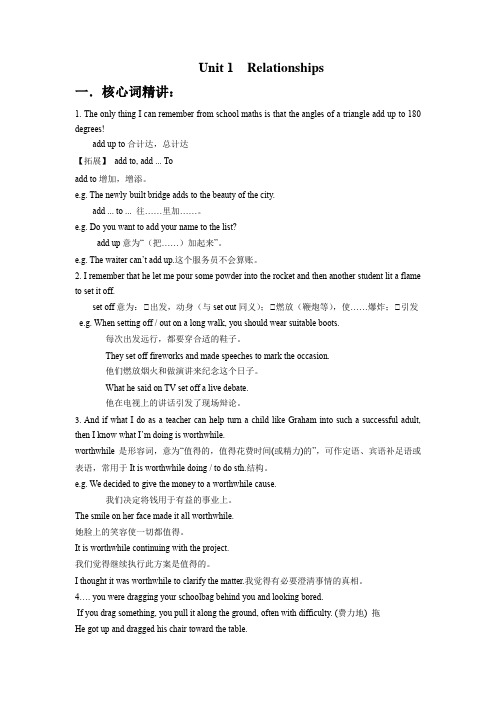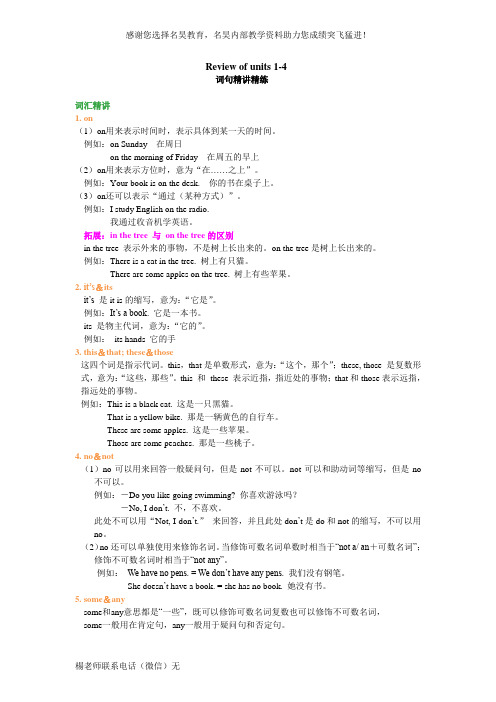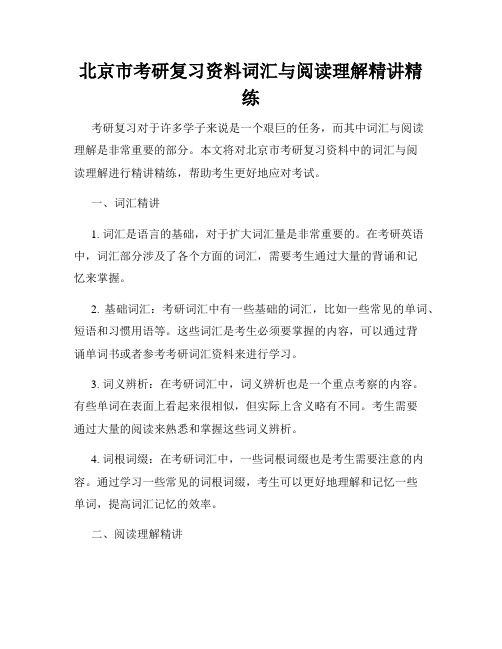配套系列101.词句精讲精练
精心设计、精讲精练的典范

竭诚为您提供优质的服务,优质的文档,谢谢阅读/双击去除精心设计、精讲精练的典范[作者] 刘晋生[内容]——特级教师宁鸿彬初中语文教学经验的研究(山西刘晋生)北京市第八十中学宁鸿彬老师的语文教学有一个非常显著的特点,就是一个“精”字。
这个“精”字,既体现在他的语文教育观念上,也体现在他的语文教学实践中。
宁老师改革语文教学的指导思想是:“重视研究在减轻学生负担的情况下,保证和提高教学质量。
”宁老师在观念上的“精”表现在他对人们普遍认同的“苦学”、“多练”持否定的态度。
宁老师说:“由于把基础教育的目的错误地认为就是为了升学,于是凡是能够多拿到些分数的办法便纷纷产生,不管科学与否。
”宁老师主张“精练”,就是以完成教学任务和学生的实际水平为依据,以科学的、艺术的训练措施为手段,做典型的、精要的、适量的练习。
宁老师给自己的语文教学实验提出了很高的标准,透彻一点说,他的训练目标,一是要完成教学任务,二是要切合学生的实际水平和承受能力;训练的手段:一要讲科学性,二要讲艺术性;训练内容的选择应有很强的代表性,训练过程应精要干练,训练量应因人而异,适可而止。
这是一个综合性标准,没有广博深厚的知识积累,举重若轻的驾驭能力,高效有序的训练经验是难以实现这样高的目标的。
为实现这一目标,宁鸿彬老师的基本做法是“精心设计”。
所谓“精心设计”,就是“讲”的设计要“精”,这才能扩大教学容量,保证教学质量,提高学习效率,把课外作业放在课内完成,确实减轻学生的课业负担;“练”的设计要“精”,这才能用较少的时间和精力,取得较多的收益。
宁老师抓住了语文教学活动中最基础的工作环节,认认真真地做教育规划和教学计划,精心设计讲读课与能力训练的方案,如同对待战略战术一样,从宏观的目标控制到微观的技术操作,匠心独运,精益求精,为教学实验的成功做了大量的比较精确巧妙的设计。
一、融讲练于一体做好总体设计坚持总体设计,就是针对教材与学生两方面的实际情况,做出有主有次、有点有面、有详有略、有取有舍的教学安排,融讲练于一体,讲与练相互为用,相辅相成。
辅助教材解析各教材版本对应的年级科目辅助学习资料推荐

辅助教材解析各教材版本对应的年级科目辅助学习资料推荐随着教育改革的不断深入,学生教材的种类也在逐渐增多。
不同版本的教材在内容和难度上都存在一定的差异,因此为学生选择适合的辅助学习资料变得尤为重要。
本文将对各教材版本对应的年级科目辅助学习资料进行解析,并推荐适合的辅助教材。
一、人教版人教版作为我国主要的教材版本之一,以其科学严谨的教学理念和教材编写取得了广泛的认可。
对应各年级科目的辅助学习资料如下:1. 语文- 初中:人教版语文配套辅导教材《点拨语文》- 高中:人教版语文配套辅导教材《解读语文》这些辅助教材紧密结合了人教版语文教材的特点和要求,通过精选的例题和详细讲解,帮助学生更好地掌握语文知识和技能。
2. 数学- 初中:人教版数学配套辅导教材《同步精讲精练》- 高中:人教版数学配套辅导教材《考点透析与解题方法》这些辅助教材针对人教版数学教材中的重难点进行了详细解析,帮助学生掌握数学思维和解题技巧。
- 初中:人教版英语配套辅导教材《强化训练与拓展》- 高中:人教版英语配套辅导教材《考点突破与高效备考》这些辅助教材注重英语语法、词汇、听力和阅读等方面的提高,通过大量的练习和技巧指导,帮助学生提升英语综合能力。
二、北师大版北师大版作为另一种常见的教材版本,注重知识的系统性和实践性。
对应各年级科目的辅助学习资料如下:1. 语文- 初中:北师大版语文配套辅导教材《深度解读与拓展训练》- 高中:北师大版语文配套辅导教材《重点突破与高效备考》这些辅助教材通过深入解读文本,加强对语文知识的理解和应用能力,帮助学生在阅读和写作方面取得更好的进步。
2. 数学- 初中:北师大版数学配套辅导教材《提升训练与题型解析》- 高中:北师大版数学配套辅导教材《考点剖析与解题宝典》这些辅助教材通过题型解析和典型例题的讲解,帮助学生理解数学概念和问题解决方法,提高数学思维和应用能力。
- 初中:北师大版英语配套辅导教材《拓展训练与强化突破》- 高中:北师大版英语配套辅导教材《重点整合与高效备考》这些辅助教材结合学生实际需求,注重英语听说读写各方面的训练和突破,帮助学生全面提高英语水平。
中考英语语法精讲精练系列-形容词、副词

23006
(1)形容词作定语 ①单个形容词作定语时,放在被修饰的名词前。 She is a good girl.她是一个好女孩儿。 ②形容词作不定代词的定语时,要放在不定代词的后面。 There is nothing important.没有什么重要的事情。 ③enough作形容词时,放在被修饰的名词的前后均可。 We have enough money/money enough to buy every book here. 我们有足够的钱可以买这里的每一本书。 ④“基数词单数可数名词形容词”为复合形容词,放在被修饰的名词前面。 Tom is an eightyearold boy. 汤姆是一个八岁的小男孩 (2)形容词作表语时,与连系动词构成系表结构。 The meal is delicious.这顿饭很美味。 (3)形容词作宾语补足语时,用来说明宾语的性质、状
副词的概念:副词的概念:主要用于修饰动词、形容词、其他副词或句子,用于说 明时间、地点、程度或方式等。
修饰动词
She often goes to the park. (“often”是副词,修饰动词“goes”, 说明去公园这个动作发生的频率,是时间方面的概念。)
He ran downstairs quickly. (“downstairs”是副词,修饰动词“ran”,说明跑这个动作发生的地点。)
The boy reads loudly. (“loudly”是副词,修饰动词“reads”,说明读这个动作的方式。)
23006
二、修饰形容词 说明程度:This book is very interesting. (“very”是副词,修饰形容词“interesting”,说明有趣的程度。)
三、修饰其他副词
2023年北师大版高三英语高考一轮复习U1 relationships词句文精讲精练原卷版

Unit 1 Relationships一.核心词精讲:1. The only thing I can remember from school maths is that the angles of a triangle add up to 180 degrees!add up to合计达,总计达【拓展】add to, add ... Toadd to增加,增添。
e.g. The newly-built bridge adds to the beauty of the city.add ... to ... 往……里加……。
e.g. Do you want to add your name to the list?add up意为“(把……)加起来”。
e.g. The waiter can’t add up.这个服务员不会算账。
2. I remember that he let me pour some powder into the rocket and then another student lit a flame to set it off.set off意为:①出发,动身(与set out同义);①燃放(鞭炮等),使……爆炸;①引发e.g. When setting off / out on a long walk, you should wear suitable boots.每次出发远行,都要穿合适的鞋子。
They set off fireworks and made speeches to mark the occasion.他们燃放烟火和做演讲来纪念这个日子。
What he said on TV set off a live debate.他在电视上的讲话引发了现场辩论。
3.And if what I do as a teacher can help turn a child like Graham into such a successful adult, then I know what I’m doing is worthwhile.worthwhile是形容词,意为“值得的,值得花费时间(或精力)的”,可作定语、宾语补足语或表语,常用于It is worthwhile doing / to do sth.结构。
2023年北师大版高三英语高考一轮复习必修一Unit 1 Life Choices词句文精讲精练含

Unit 1 Life Choices.核心词精讲:1. to do voluntary workvoluntary adj. done willingly, not because you are forced 志愿的,自愿的e.g. a voluntary workera voluntary organizationShe's very taken up with voluntary work at the moment.volunteer v. to offer to do something without expecting any reward, often something that other people do not want to do志愿,自愿n. someone who does a job willingly without being paid志愿者【搭配】volunteer to do sth.主动做某事volunteer for sth.自愿做某事work as a volunteer 做志愿者2・It's so convenient to be able to compare the quality and prices from different online shops... convenient adj. useful to you because it saves you time, or does not spoil your plans or cause you problems便利的,方便的e.g. Shopping on the Internet is a convenient way to buy things.【搭配】be convenient for sb.对某人方便at a convenient time在方便的时间It is convenient (for sb.) to do sth.(某人)做某事很方便。
toefl junior 词汇精讲精练 配套书

toefl junior 词汇精讲精练配套书
《TOEFL Junior词汇精讲精练》是一本专门针对TOEFL Junior考试的词汇教材。
本书以1500个重点词汇为基础,结合了考试所需的四
个语言技能——听力、阅读、口语和写作。
下面将对书中的内容进行
详细介绍。
第一部分是词汇精讲,该部分按照字母顺序组织词汇,每一页介
绍一个词汇,并提供了中文解释、词性、释义和例句。
这样的排版便
于学生快速浏览和记忆。
第二部分是词汇精练,该部分提供了大量的练习题,以帮助学生
巩固所学词汇。
练习题包括单项选择、填空、改错、词汇选择和句子
翻译等。
该教材的优势在于它不仅提供了词汇的学习,还通过练习题的形式,让学生在实际运用中加深对词汇的理解和记忆。
这种结合可以帮
助学生更好地应对TOEFL Junior考试中的词汇题。
除了教材本身,该套书还附带了一个在线学习平台。
学生可以通
过该平台进行自主学习,进行刷题和模拟考试,以强化对词汇的掌握。
总体来说,《TOEFL Junior词汇精讲精练》是一本很实用的教材,在准备TOEFL Junior考试的学生中广为使用。
它的内容丰富,形式多样,能满足学生的练习需求。
同时,配套的在线学习平台也提供了更
多的学习资源和辅助功能,使学生更加高效地学习和备考。
精讲精练 七下语

(二)1. 告诉年青人不要寄希望于命运的全面优待,而是倚重人间的爱愿,倚重人们相互心灵的沟通、了解,相互精神的支持、信任。2. 他与人们的心灵沟通,让他知道了:困境来了,大家跟你在一起,但谁也不能让困境消灭,每个人必须自己鼓起勇气,镇静地面对它。 3. 困境不可能没有,艰难不可能彻底消灭,但是人与人之间的交流、沟通、宣泄与倾听,却可能使人获得一种新的生活态度,或达到一种新境界。
3. 丑小鸭
【课前自学】(一)1. 丹麦 安徒生 2. 安徒生3. 略
(பைடு நூலகம்)1. 陋 zǐ jǔ 骇 屐 钳 嫉 mí 2. 来势汹汹:形容动作或事物到来的气势很猛烈。讪笑:含有讥笑并使人难为情的意思。
(四)1. 本文主要讲述了一只丑小鸭经过自己的不懈努力最终变成了一只白天鹅的故事。2. 沼泽地——老太婆家(农家小屋)——灌木林里——老农家——花园里
【课后拓展】(一)母爱就是儿女病榻前的关切焦灼(母爱就是儿女成长的殷殷期盼。)父爱如山,深沉而又博大。
(二)1. “母亲大多数的时候是悄无声息地躺着的,有时想说话,‘我’又不耐烦”等处,可看出母亲内心孤寂,又从问我“累不累,让我躺下歇一歇”等处,反映出母亲对“我”无微不至的关爱。2. (1)“若有所思”一词从神态角度形象地刻画出母亲对我只顾在电脑上与陌生人聊天的不解与无奈之情,从而突出了母亲的孤寂之感。(2)“暖暖的”形象写出了“我”躺在母亲身边的惬意之感。通过触觉含蓄隽永地表达出“我”多年后重新体验到亲情时的幸福感。 3. 插叙。这两个自然段补充交代了母亲生病的原因及母亲生病时仍常年一个人忙里忙外,默默承受疾病折磨,最后积劳成疾却遭受家人报怨的事实,这样写使母亲的形象更详明,文章内容更充实,中心更突出。4. 在忙碌的现代生活中,人们常常沉迷于虚拟的网络世界里,忘记了对身边亲人的关爱,文章的结尾发出对人间真情的呼唤,升华了文章的主旨,读后发人深思。5. 略
Review of units 1-4词句精讲精练

Review of units 1-4词句精讲精练词汇精讲1. on(1)on用来表示时间时,表示具体到某一天的时间。
例如:on Sunday 在周日on the morning of Friday 在周五的早上(2)on用来表示方位时,意为“在……之上”。
例如:Your book is on the desk. 你的书在桌子上。
(3)on还可以表示“通过(某种方式)”。
例如:I study English on the radio.我通过收音机学英语。
拓展:in the tree 与on the tree的区别in the tree 表示外来的事物,不是树上长出来的。
on the tree是树上长出来的。
例如:There is a cat in the tree. 树上有只猫。
There are some apples on the tree. 树上有些苹果。
2. it’s&itsit’s 是it is的缩写,意为:“它是”。
例如:It’s a book. 它是一本书。
its 是物主代词,意为:“它的”。
例如:its hands 它的手3. this&that; these&those这四个词是指示代词。
this,that是单数形式,意为:“这个,那个”;these, those 是复数形式,意为:“这些,那些”。
this 和these 表示近指,指近处的事物;that和those表示远指,指远处的事物。
例如:This is a black cat. 这是一只黑猫。
That is a yellow bike. 那是一辆黄色的自行车。
These are some apples. 这是一些苹果。
Those are some peaches. 那是一些桃子。
4. no&not(1)no可以用来回答一般疑问句,但是not不可以。
not可以和助动词等缩写,但是no 不可以。
例如:-Do you like going swimming? 你喜欢游泳吗?-No, I don’t. 不,不喜欢。
Module 10 Spring Festival 词句精讲精练

Module 10 Spring Festival精讲精练词汇精讲1. get ready forget ready for意为“为……做准备”。
例如:The farmers are getting ready for the next year.农民们正在为明年做准备。
拓展:ready是形容词,意为“有准备的”。
例如:Are you ready?你准备好了吗?be ready for 强调状态,意为“为……做好了准备”。
例如:They are ready for the party. 他们为聚会做好了准备。
get ready for强调动作,意为“为……做准备”。
例如:All the students are getting ready for the sports meeting.所有学生在为运动会做准备。
2. cookcook作及物动词,意为“烧饭”,其后可接三餐或具体的某种菜肴作宾语,也可作不及物动词。
例如:My mother cooks breakfast for me every morning.妈妈每天早上给我做早饭。
例如:She’s cooking now. 她正在做饭。
拓展:1)cook 作名词,意为“厨师”。
例如:His uncle is a good cook. 他的叔叔是一个好厨师。
2)cook 后加-er,构成cooker,是可数名词,意为“厨具”例如:There are all kinds of cookers in the supermarket.超市里有各种各样的厨具。
3. happenhappen是不及物动词,后面不能直接接宾语,意为“发生”。
若表示“某地/某时发生了某事”用“sth + happen +地点/时间”;若表示“某人出了某事”,则用“sth happen to sb”。
例如:What happened yesterday morning? 昨天早晨发生了什么事?What happened to you? 你发生了什么事?拓展:happen作“碰巧”讲,其后接动词不定式,即“sb happen to do sth”,意为“某人碰巧做某事”。
肖秀荣考研政治系列的《知识点精讲精练》

肖秀荣考研政治系列的《知识点精讲精练》一、肖秀荣考研政治系列的《知识点精讲精练》肖秀荣考研政治系列的《知识点精讲精练》是一部备受考研学子欢迎的政治复习资料,它以其深度和广度兼具的特点,帮助考生全面理解和掌握政治学科的知识点。
在这个系列中,作者肖秀荣以她在政治学科的丰富经验和深刻理解为基础,对政治学科各个知识点进行了系统的讲解和精练,使得考生能够在较短的时间内掌握政治学科的重要知识,提高复习效率。
这对于广大考研学子来说无疑是一份宝贵的学习资料。
二、从简到繁,由浅入深的全面评估在《知识点精讲精练》系列中,作者肖秀荣采取了从简到繁、由浅入深的方式来探讨每一个知识点。
她首先从基础知识开始,引导读者逐步深入理解,而后再逐渐展开扩展,使得读者能够在不断深入的过程中逐渐掌握并牢固记忆政治学科的知识点。
这种深度和广度兼具的全面评估方式,对于考研学子来说极具帮助,因为他们能够更深入地理解政治学科的知识,并且能够应对考试中各种复杂的题目。
在每一个章节中,肖秀荣都会围绕着特定的知识点,对其进行详细的讲解,包括相关的历史背景、重要概念、相关案例等等。
这种详细的全面评估,有助于读者对政治学科的知识点有一个更加全面、深刻的理解,使得复习过程更加高效。
三、指定主题文字在文章中的多次提及在本文中,我们一直在讨论《知识点精讲精练》这一系列资料。
作者肖秀荣对于政治学科知识点的讲解,给考研学子提供了宝贵的学习资料。
她以其丰富的经验和深刻的理解,对政治学科的知识点进行了精讲,帮助考生全面复习政治学科。
四、总结和回顾性的内容通过对《知识点精讲精练》的全面评估,我们对作者肖秀荣的用心和专业有了更深的认识。
她在这个系列资料中所展示的深度和广度兼具的方式,能够帮助考生更好地掌握政治学科的知识,提高复习效率。
作者在每一章节都进行了详细的讲解,让考生能够有一个更加全面、深刻的理解,这对于备战考研的学子来说至关重要。
五、个人观点和理解在我看来,肖秀荣考研政治系列的《知识点精讲精练》是一份非常有价值的政治学科复习资料。
人教版2020九年级英语上册 Module 4 Home alone词句精讲精练 (新版)外研版

Module 4 Home alone词句精讲精练【词汇精讲】1. missmiss为动词,意为“想念,思念”。
例如:I’ll miss you when you go to Canada. 你到了加拿大以后,我一定会想你。
【拓展】(1) miss作动词还有“未击中,未抓住”的意思。
例如:I tried to hit the ball but I missed. 我努力地想击中球,但却未成功。
(2) miss还可意为“未赶上,错过”,是动词。
例如:I missed the football match on TV last night. 我错过了昨天晚上电视中的足球赛。
(3) miss与like; mind; finish; enjoy; practice; be busy; stop; can’t help; give up等词一样后接动词的-ing形式。
例如:I don’t want to miss seeing that film on television tonight.我不想错过今晚在电视上看那部影片的机会。
2. hand inhand in是固定搭配,意为“上交;交出”,hand在此处为动词。
例如:— Must he hand in his homework this morning? 他必须今天上午交作业吗?—No, he needn’t. 不,不必了。
hand还可以作名词,意为“手”。
例如:Mike put his hand up three times during the class.在这节课内,Mike举了三次手。
Did you notice his hand shaking?你有没有注意到他的手在抖?3. though(1) though可以作连词,意为“虽然;即使;纵然”,放在从句的开头和中间均可。
例如:Though it was raining, we were still working. 虽然下着雨,但我们仍然坚持工作。
2019-2020年九年级世界历史(下)每课时精讲精练系列(人教版)

2019-2020年九年级世界历史(下)每课时精讲精练系列(人教版)一、基础知识(一)国际反法西斯同盟的形成1.背景:珍珠港事件后,二战规模扩大,面对德意日法西斯的疯狂进逼,世界反法西斯国家开始逐步走向联合。
2.标志:1942年1月,中苏美英等26国在华盛顿签署《联合国家宣言》,标志着世界反法西斯同盟的正式形成。
3.意义:反法西斯统一战线的建立,壮大了反法西斯国家的力量,鼓舞了世界人民反法西斯的斗志,对加速反法西斯战争的胜利起了极为重要的作用。
(二)斯大林格勒战役1.经过:1942年7月,德国集中兵力,向斯大林格勒发动了进攻。
苏联军民誓死保卫斯大林格勒,11月中旬转入反攻。
1943年2月初,德军投降,苏联向德军展开进攻。
2.意义:斯大林格勒战役的胜利是苏德战场的转折点,也是整个第二次世界大战的重要转折点。
(三)雅尔塔会议1.时间:1945年初2.参与国:苏、美、英3.地点:雅尔塔4.主要内容:彻底消灭德国军国主义和法西斯主义,惩办战犯;战后德国由盟国军队分区占领,实现德国民主化;战后成立联合国;苏联答应有条件地参加对日作战。
5.作用:实际上划分了战后世界的势力范围,战后出现的世界两极格局。
雅尔塔会议加速了日本投降。
(四)最后的胜利1.意大利投降:1943年,美英盟军进入意大利,墨索里尼法西斯政权垮台,意大利新政府宣布投降并对德作战。
2.德国投降(1)诺曼底登陆:1944年6月,美英盟军在法国诺曼底登陆,开辟了打击德国法西斯的第二个战场。
美英军队和苏军攻入德国境内,德国的失败已成定局。
(2)攻克柏林:1945年,苏军攻克柏林,希特勒自杀。
(3)德国在无条件投降书上签字:1945年5月8日。
3.日本投降(1)背景:美军先后在日本的广岛和长崎投下原子弹。
苏联宣布对日作战,出兵中国东北和朝鲜,亚洲各国人民也向日本侵略者发动了猛烈进攻。
(2)标志:1945年8月15日,日本宣布无条件投降。
1945年9月2日,日本政府正式签署投降书。
初中英语 知识讲解( 含答案)

Unit 4 Life on Mars词句精讲精练词汇精练1. rapidrapid 作形容词,意为“快的,迅速的”。
例如:He made rapid progress in English. 他在英语方面取得了很快的进步。
【拓展】rapid,fast &quick2. large numbers oflarge numbers of 表示“许多,大量的”,相当于a large number of。
a number of 意为“许多……”,修饰可数名词复数。
做主语时,谓语动词用复数。
number 前可用large,small等修饰,以表示程度。
例如:Large numbers of students are playing games together. 许多学生正在一起玩儿游戏。
A number of villagers are planting trees on the hill. 许多村民正在山上植树。
3. journey, travel, trip, tour4. tastytasty 作形容词,意为“美味的,可口的”。
例如:The dishes are tasty. 这些菜很美味。
【拓展】(1)taste 为连系动词,意为“尝起来”,后接形容词,有时可接介词like。
例如:This tomato tastes good. 这个西红柿尝起来不错。
(2)taste也可以作名词,意为“味道,滋味”。
例如:This orange has sweet taste. 这种橘子有甜味。
5. kind(1)kind 作可数名词,意为“种类,类别,类型”,常与of连用构成短语,常见的有:a kind of (一种); different kinds of (不同种类的);all kinds of (各种各样的); 这些短语后可以接不可数名词或可数名词的单数或复数。
例如:The supermarket sells all kinds of goods. 超市出售各种各样的商品。
Unit 5 Let's celebrate ! 词句精讲精练

Unit5Let’s celebrate【词汇精讲】1.celebratecelebrate在本单元中是不及物动词,意为“庆祝”。
“celebrate”的名词形式是“celebration”,意为“庆祝,庆祝活动”。
例如:Today is Children’s Day,let’s celebrate!今天是儿童节,让我们庆祝一下吧!We will have a celebration for our success.我们要为我们的成功庆祝一下。
2.dress1)dress既可以做动词也可以做名词。
dress用作名词时,一般为可数名词,主要指连衣裙或者上下连体的女装;也可以指小孩穿的衣服,但不指男装。
例如:She has a beautiful dress.她有一件漂亮的裙子。
2)dress做动词时意为“穿着,穿衣”,后面一般接表示人的名词或代词作宾语,不接表示衣服的名词。
例如:The boy can dress himself.那个男孩儿可以自己穿衣服。
“dress up”意为“装扮,乔装打扮”或者“穿上盛装,打扮”。
例如:You don’t need dress up for the party.你不必为这个聚会精心打扮。
“dress up as”意为“装扮成……,打扮成……”。
例如:The boy often dresses up as a monkey.那个男孩常装扮成一只猴子。
【拓展】wear,put on,dress&inwear表示穿着、戴着的某种状态She wears a pink coat.她穿着一件粉红色大衣。
put on表示穿戴的动作She puts on her pink coat.她穿上一件粉红色的大衣。
dress后接人作宾语,表示“给……穿衣”She dresses herself every day.她每天自己穿衣。
in与wear都表示“穿”或者“戴”,wear在句中作谓语,in与其他词一起构成介宾短语,做句子的定语、表语等。
专题02 诗歌形象之景物形象(配套练习)(解析版)-2024高考语文复习之古诗考点精讲精练

专题02 诗歌形象之景物形象(配套练习解析版)一、(2020·天津卷)阅读下面这首唐诗,完成下面小题。
纪 村 事[唐]韦庄绿蔓映双扉,循墙一径微。
雨多庭果烂,稻熟渚禽肥。
酿酒迎新社, 遥砧送暮晖。
数声牛上笛,何处饷田注归。
[注] 饷田:到田间送饭(1)下列对这首诗的理解和赏析,不正确的一项是()A.首联写绿植光影映照门扉,墙边小路在草木中若隐若现,显得生机勃勃。
B.颔联写院中果子腐烂,水边禽鸟肥美,营造出农闲时节慵懒闲散的宁静氛围。
C.全诗视听结合,动静相宜,虚实相生,用语平朴,意境优美,富有意趣。
D.本诗撷取若干乡村景象,自然与人文融合,呈现出浓郁的田园生活气息。
【参考答案】B【解析】B项,“营造出农闲时节慵懒闲散的宁静氛围”中的“农闲”“慵懒”错误,本诗描写的应该是农忙季节,“雨多庭果烂”,既写出了季节特点,又写出了农人无暇打理庭院的果树,“稻熟渚禽肥”,描绘了丰收的景象,联系颈联“酿酒迎新社,遥砧送暮晖”中的“酿酒”“砧”和结尾句的注释“饷田:到田间送饭”可见是忙碌而充实的田园氛围,颔联是为展现农忙时节农家人的劳作做铺垫。
(2)“酿酒迎新社,遥砧送暮晖”描写了什么样的乡村场景? (2分)【参考答案】为准备祭祀、祈求丰收,农人在忙于酿酒;暮色渐浓,远处飘来捣衣的声音。
描写了忙碌而祥和的农村生活场景。
【解析】本题考查学生鉴赏诗歌意境的能力。
首先用优美的语言描绘这两句诗歌的内容。
为准备祭祀、祈求丰收,农人在忙于酿酒;暮色渐浓,远处飘来捣衣的声音。
其次点明意境氛围特点:繁忙、充实、安宁、祥和。
最后总结效果:百姓安居乐业,是一幅优美的田园生活图景。
二、(2019·天津卷)阅读下面这首诗,按要求作答。
通泉驿南去通泉县十五里山水作①[唐]杜甫 溪行衣自湿,亭午气始散。
冬温蚊蚋集,人远凫鸭乱。
登顿生曾阴,欹倾出高岸。
驿楼衰柳侧,县郭轻烟畔。
一川何绮丽,尽日穷壮观。
山色远寂寞,江光夕滋漫。
If you go to the party, you’ll have a great time! 知识讲解

Unit 10 If you go to the party, you’ll have a great time!词句精讲精练词汇精讲1. upset(1) upset可作形容词,意为“难过的;失望的;沮丧的”。
例如:Don’t get so upset. 别那么沮丧。
After she died I felt very, very upset. 她去世之后,我非常非常难过。
(2) upset还可作动词,意为“使心烦意乱,使生气”。
例如:She warned me not to say anything to upset him. 她警告我不要说任何让他不高兴的话。
Don’t upset yourself, Ida.别自寻烦恼了,艾达。
(3) be upset with sb. 意为“生某人的气”。
例如:She is still upset with me. 她还在生我的气。
2. adviceadvice是不可数名词,意为“意见、建议、劝告、忠告”,不能与不定冠词a 连用。
例如:a piece of advice一条建议Let me give you some advice. 让我给你一些建议。
【拓展】(1) give sb. advice (on) 给……提(有关……)的建议。
例如:Can you give me some advice on how to learn English well?你能给我一些关于如何学好英语的建议吗?(2) take one’s advice 听从某人的建议例如:I’ll take your advice, and do exercise every day. 我会听从你的建议,每天锻炼身体。
(3) advise是advice的动词形式,意为“建议”,常用于advise sb. to do sth.的结构中。
例如:He advised me to read English every morning. 他建议我每天早晨读英语。
高中英语2024届复习词汇精讲精练系列0322(sw ing~test)

高考英语词汇精讲精练(sw ing~test)一、词汇积累1.swing [swɪŋ] vt.挥舞, 摆动 n.秋千2.switch [swɪtʃ] v./ n.开关,转换,改变3.symbol [ˈsɪmbəl] n.象征4.sympathy [ˈsɪmpəθɪ] n.同情5.symphony [ˈsɪmfənɪ] n.交响乐6.system [ˈsɪstəm] n.体系;系统7.table [ˈteɪbəl] n.桌子, 表格8.tablet [ˈtenɪs] n.药片9.tail [teɪl] n.尾巴10.tailor [ˈteɪlə] n.裁缝11.take [teɪk] vt.拿走;乘坐;花费12.tale [teɪl] n.故事, 传说13.talent [ˈtælənt] n.天才, 天赋14.talk [tɔːk] n.& v.谈话,讲话,交谈15.tall [tɔːl] a.高的16.tank [tæŋk] n.储水容量;坦克17.tap [tæp] n.龙头18.tape [teɪp] n.磁带;录音带19.target [ˈtɑːɡɪt] n./ v.目标20.task [tɑːsk] n.任务, 工作21.taste [teɪst] n.味道 vt.品尝, 尝味22.tax [tæks] n.税, 税款23.taxi [ˈtæksɪ] n.出租汽车24.tea [tiː] n.茶;茶叶25.teach [tiː] v.教书,教26.teacher [ˈtiːtʃə] n.教师, 教员27.team [tiːm] n.队, 组28.teapot [ˈtiːpɔt] n.茶壶29.tear [teə] n.眼泪 v.扯破, 撕开30.technique [ˈteknɪkəl] n.技术;技巧,方法31.technology [tekˈnɔlədʒɪ] n.技术32.teenager [ˈtiːneɪdʒə] n.青少年, 十几岁少年33.telegram [ˈtelɪɡræm] n.电报34.telephone [ˈtelɪɡrɑːf] v.打电话 n.电话35.telescope [ˈtelɪɡrɑːf] n.望远镜36.television [ˈtelɪɡrɑːf] n.电视37.tell [tel] vt.告诉,讲述,吩咐38.temperature [ˈtemprɪtʃə] n.温度39.temple [ˈtempəl] n.庙宇, 寺院40.temporary [ˈtempərərɪ] a.短暂的, 暂时的41.temptation [tempˈteɪʃən] n.引诱;诱惑42.tend [tend] v.往往会,倾向, 趋于43.tendency [ˈtendənsɪ] n.倾向, 偏好, 性情44.tennis [ˈtenɪs] n.网球45.tense [tens] a.紧张的 v.拉紧46.tension [ˈtenʃən] n.紧张局势, 矛盾47.tent [tent] n.帐篷48.term [tɜːm] n.学期;术语;条款;项49.terrible [ˈterɪbəl] a.可怕的;糟糕的3200.test [test] vt.& n.测试, 考查, 试验二、词形转换1.symbol n.象征→symbolic a.象征性的→symbolism n.象征主义2.sympathy n.同情→sympathetic a.表示同情的3.system n.体系;系统→systematic a.系统的;有条理的4.talent n.天才, 天赋→talented a.有才能的;天才的5.talk n.& v.谈话,讲话,交谈→talkative a.多嘴的;健谈的6.tasten.味道 vt.品尝, 尝味→tasty a.美味的;可口的7.tax n.税, 税款→taxpayer n.纳税人8.tean.茶;茶叶→ teapot n.茶壶9.teach v.教书,教→teaching n.教学→teacher n.教师, 教员10.team n.队, 组→teamwork n.团队合作11.technique n.技术;技巧,方法→technical a.技巧的;工艺的→technician n.技术员;技师12.technology n.技术→technological a.技术的,科技的13.teenage a.十几岁的(指13至19岁);青少年的→teenager n.青少年, 十几岁少年14.tell vt.告诉,讲述,吩咐→teller n.出纳,出纳15.temporary a.短暂的, 暂时的→temporarily ad.短暂的, 暂时的16.tempt vt.引诱;诱惑→temptation n.引诱;诱惑17.tend v.往往会,倾向, 趋于→temdemcy n.倾向, 偏好, 性情18.tense a.紧张的 v.拉紧→tension n紧张局势, 矛盾→tensely ad.紧张地;拉紧地19.terrible a.可怕的;糟糕的→terror n.惊恐;恐惧→terribly ad.非常地→terrify vt.使恐惧三、短语积累1.switch on 打开2.switch off 关闭3.switch over to 转换到3.show sympathy for 对…表现出同情4.table manners 餐桌礼仪5.table tennis 乒乓球6.take apart 把…拆开7.take back 收回8.take in 吸收;招聘;(被)欺骗9.take off 起飞;脱下;有起色;请假10.take out 拿出来11.take over 接管12.take to开始从事;喜欢13.take up 占据;从事14.have a talent for有…天赋15.talk to/with sb和某人谈话16.talk of/about 谈论17.talk sb into doing 说服某人做某事18.pay tax交税19.take a taxi打的20.black tea红茶21.burst into tears突然大哭22.tear up 撕开23.tell off 训斥24.tell apart 把…区分开25.take one’s temperature 量体温26.tempt sb to do sth诱骗某人做某事27.tend to do 往往会做28.tend to sth 处理;照料29.play tennis 打乒乓球st term 上学期31.in the long term 长远来看32.in terms of 就…而言33.be on good terms with与…相处融洽四、英译汉1.swing [swɪŋ] vt.________ n.________2.switch [swɪtʃ] v./ n.________3.symbol [ˈsɪmbəl] n.________4.sympathy [ˈsɪmpəθɪ] n.________5.symphony [ˈsɪmfənɪ] n.________6.system [ˈsɪstəm] n.________7.table [ˈteɪbəl] n.________8.tablet [ˈtenɪs] n.________9.tail [teɪl] n.________10.tailor [ˈteɪlə] n.________11.take [teɪk] vt.________12.tale [teɪl] n.________13.talent [ˈtælənt] n.________14.talk [tɔːk] n.& v.________15.tall [tɔːl] a.________16.tank [tæŋk] n.________17.tap [tæp] n.________18.tape [teɪp] n.________19.target [ˈtɑːɡɪt] n./ v.________20.task [tɑːsk] n.________21.taste [teɪst] n.________ vt.________22.tax [tæks] n.________23.taxi [ˈtæksɪ] n.________24.tea [tiː] n.________25.teach [tiː] v.________26.teacher [ˈtiːtʃə] n.________27.team [tiːm] n.________28.teapot [ˈtiːpɔt] n.________29.tear [teə] n.________ v.________30.technique [ˈteknɪkəl] n.________31.technology [tekˈnɔlədʒɪ] n.________32.teenager [ˈtiːneɪdʒə] n.________33.telegram [ˈtelɪɡræm] n.________34.telephone [ˈtelɪɡrɑːf] v.________ n.______35.telescope [ˈtelɪɡrɑːf] n.________36.television [ˈtelɪɡrɑːf] n.________37.tell [tel] vt.________38.temperature [ˈtemprɪtʃə] n.________39.temple [ˈtempəl] n.________40.temporary [ˈtempərərɪ] a.________41.temptation [tempˈteɪʃən] n.________42.tend [tend] v.________43.tendency [ˈtendənsɪ] n.________44.tennis [ˈtenɪs] n.________45.tense [tens] a.________ v.________46.tension [ˈtenʃən] n.________47.tent [tent] n.________48.term [tɜːm] n.________49.terrible [ˈterɪbəl] a.________3200.test [test] vt.& n.________五、汉译英1.________ [swɪŋ] vt.挥舞, 摆动 n.秋千2.________ [swɪtʃ] v./ n.开关,转换,改变3.________ [ˈsɪmbəl] n.象征4.________ [ˈsɪmpəθɪ] n.同情5.________ [ˈsɪmfənɪ] n.交响乐6.________ [ˈsɪstəm] n.体系;系统7.________ [ˈteɪbəl] n.桌子, 表格8.________ [ˈtenɪs] n.药片9.________ [teɪl] n.尾巴10.________ [ˈteɪlə] n.裁缝11.________ [teɪk] vt.拿走;乘坐;花费12.________ [teɪl] n.故事, 传说13.________ [ˈtælənt] n.天才, 天赋14.________ [tɔːk] n.& v.谈话,讲话,交谈15.________ [tɔːl] a.高的16.________ [tæŋk] n.储水容量;坦克17.________ [tæp] n.龙头18.________ [teɪp] n.磁带;录音带19.________ [ˈtɑːɡɪt] n./ v.目标20.________ [tɑːsk] n.任务, 工作21.________ [teɪst] n.味道 vt.品尝, 尝味22.________ [tæks] n.税, 税款23.________ [ˈtæksɪ] n.出租汽车24.________ [tiː] n.茶;茶叶25.________ [tiː] v.教书,教26.________ [ˈtiːtʃə] n.教师, 教员27.________ [tiːm] n.队, 组28.________ [ˈtiːpɔt] n.茶壶29.________ [teə] n.眼泪 v.扯破, 撕开30.________ [ˈteknɪkəl] n.技术;技巧,方法31.________ [tekˈnɔlədʒɪ] n.技术32.________ [ˈtiːneɪdʒə] n.青少年, 十几岁少年33.________ [ˈtelɪɡræm] n.电报34.________ [ˈtelɪɡrɑːf] v.打电话 n.电话35.________ [ˈtelɪɡrɑːf] n.望远镜36.________ [ˈtelɪɡrɑːf] n.电视37.________ [tel] vt.告诉,讲述,吩咐38.________ [ˈtemprɪtʃə] n.温度39.________ [ˈtempəl] n.庙宇, 寺院40.________ [ˈtempərərɪ] a.短暂的, 暂时的41.________ [tempˈteɪʃən] n.引诱;诱惑42.________ [tend] v.往往会,倾向, 趋于43.________ [ˈtendənsɪ] n.倾向, 偏好, 性情44.________ [ˈtenɪs] n.网球45.________ [tens] a.紧张的 v.拉紧46.________ [ˈtenʃən] n.紧张局势, 矛盾47.________ [tent] n.帐篷49.________ [tɜːm] n.学期;术语;条款;项3200.________ [ˈterɪbəl] a.可怕的;糟糕的48.________ [tɜːm] n.学期;术语;条款;项49.________ [ˈterɪbəl] a.可怕的;糟糕的3200.________ [test] vt.& n.测试, 考查, 试验六、单句填空阅读下面句子,在空白处填入1个适当的单词或括号内单词的正确形式。
北京市考研复习资料词汇与阅读理解精讲精练

北京市考研复习资料词汇与阅读理解精讲精练考研复习对于许多学子来说是一个艰巨的任务,而其中词汇与阅读理解是非常重要的部分。
本文将对北京市考研复习资料中的词汇与阅读理解进行精讲精练,帮助考生更好地应对考试。
一、词汇精讲1. 词汇是语言的基础,对于扩大词汇量是非常重要的。
在考研英语中,词汇部分涉及了各个方面的词汇,需要考生通过大量的背诵和记忆来掌握。
2. 基础词汇:考研词汇中有一些基础的词汇,比如一些常见的单词、短语和习惯用语等。
这些词汇是考生必须要掌握的内容,可以通过背诵单词书或者参考考研词汇资料来进行学习。
3. 词义辨析:在考研词汇中,词义辨析也是一个重点考察的内容。
有些单词在表面上看起来很相似,但实际上含义略有不同。
考生需要通过大量的阅读来熟悉和掌握这些词义辨析。
4. 词根词缀:在考研词汇中,一些词根词缀也是考生需要注意的内容。
通过学习一些常见的词根词缀,考生可以更好地理解和记忆一些单词,提高词汇记忆的效率。
二、阅读理解精讲1. 阅读理解是考研英语中的一个重要部分,考察考生的阅读能力和理解能力。
在考研复习中,对于阅读理解的精讲是非常必要的。
2. 阅读策略:在阅读理解中,考生需要掌握一些阅读策略,比如快速浏览、精读、略读等。
通过运用不同的阅读策略,考生可以更好地理解和把握文章的主旨和要点。
3. 题目类型:阅读理解中的题目类型有多种,包括主旨题、事实细节题、推理判断题等。
对于不同类型的题目,考生需要学会分析和解答。
通过做大量的题目和模拟考试,考生可以更好地熟悉和掌握各种题型。
4. 理解文章结构:在阅读理解中,理解文章的结构是非常重要的。
通过把握文章的段落组织和逻辑关系,考生可以更好地理解和分析文章的内容。
结语:通过本文的精讲精练,相信考生对于北京市考研复习资料中的词汇与阅读理解有了更深入的了解。
希望考生能够利用好复习资料,加强词汇记忆和阅读理解能力,以顺利通过考研。
加油!。
- 1、下载文档前请自行甄别文档内容的完整性,平台不提供额外的编辑、内容补充、找答案等附加服务。
- 2、"仅部分预览"的文档,不可在线预览部分如存在完整性等问题,可反馈申请退款(可完整预览的文档不适用该条件!)。
- 3、如文档侵犯您的权益,请联系客服反馈,我们会尽快为您处理(人工客服工作时间:9:00-18:30)。
Unit 4 Why don’t you talk to your parents?词句精讲精练词汇精讲1. allowallow作动词,意为“允许”。
用法如下:(1)allow sth.意为“允许某事的发生”。
例如:I can’t allow such a thing. 我不允许发生这样的事。
(2)allow doing sth.意为“允许做某事”。
例如:We don’t allow eating in the classrooms. 我们不允许在教室吃饭。
We don’t a llow smoking here. 我们不允许在此抽烟。
(3)allow sb. to do sth.意为“允许某人做某事”。
例如:Her father would not allow her to eat sweets. 她父亲不允许她吃糖果。
They don’t allow students to smoke in the classroom. 他们不允许学生在教室抽烟。
(4)allow sb. sth. 意为“给予某人某物(尤指钱或时间);让某人有(拥用或带有)某物”。
例如:He allows his son too much money. 他给他儿子的钱太多。
We’ll allow you time to answer. 我们将给你回答的时间。
2. get on withget on意为“相处,进展”,也可用get along,其后接介词with。
get on with sb. 意为“与某人和睦相处/关系良好”;get on well/badly with sth. 意为“某事进展顺利/不好”。
例如:He gets on (well) with his classmates.他和同学们相处融洽。
How do you get on with your studies?你的学业进展如何?【拓展】get on 还有“上车”的意思,后面常接bus; train等表示交通工具的词;反义词为get off。
例如:The old man got on/ off the bus slowly.那位老人慢慢地上/下了公共汽车。
3. argueargue作动词,意为“争论,争吵”。
常用短语为:argue with sb. 与某人争吵argue about/on sth. 争辩某事argue for/against sth. 为赞成/反对某事而辩论例如:Mrs. Brown argued with the waiter about the price of the meal.布朗夫人因为那顿饭的价格跟服务员争吵。
Next class we’re arguing about family activities. 下节课我们辩论家庭活动。
argue对应的名词为argument,常用词组为:have an argument with sb. about/ on sth. 因某事与某人争论。
例如:I had an argument with my best friend last week. 上星期我与我最好的朋友吵了一架。
【拓展】argue与discuss的辨析:(1)argue着重于自己的看法、立场,提出论据,以理说服他人。
例如:There is no need arguing about the matter. 不必就此事辩论了。
(2)discuss重在交换意见,进行讨论,不含有说服对方的成分。
例如:We’re going to discuss the question. 我们打算讨论这个问题。
4. insteadinstead作副词,意为“代替,而不是”,常用作状语。
例如:He is tired. Let me go instead. 他累了,让我替他去吧。
She never studies. Instead, she plays tennis all day. 她从不学习,而是整天打网球。
【拓展】instead与instead of的辨析:(1)instead是副词,后面不接其他的词,一般情况下可不译出,通常放在句首或句末,在句首时常用逗号隔开,表示前面的事没做,而做了后面的事。
例如:He didn’t go to school. Instead, he went to the cinema.他没有去学校,相反他去了电影院。
(2)instead of是介词短语,意为“代替,而不是”,后面可以跟与前面并列成分相应的名词、代词、动词-ing形式等作为介词宾语。
例如:He went to the cinema instead of going to school.他去了电影院而不是学校。
5. offer(1)offer 作动词,意为“给予;提供;提出”。
例如:He offered me 300 dollars for that old car.他出300美元向我买那辆旧车。
Offer some coffee to the guests.给客人端些咖啡来。
He offered me a cup of tea.他给了我一杯茶。
(2)offer to do sth. 表示“愿意做某事;主动提出做某事”。
例如:I offered to help my mother do housework.我主动提出帮助妈妈做家务。
She offered to drive me to the station.她表示愿意开车送我去车站。
6. explainexplain是动词,意为“解释,说明,阐明”。
其用法如下:(1)explain sth. to sb.意为“向某人解释某事”。
例如:Please explain that rule to me.请把这条规则给我讲一讲。
(2)“explain (to sb.) + 疑问词+ 从句”意为“向某人解释……”。
例如:Please explain to me what this means.请向我解释这是什么意思。
(3)“explain + that从句”意为“解释……”。
例如:He explained that we could no longer stay.他解释说我们不能再待下去了。
【注意】explain后面不能接双宾语,在接间接宾语sb.时,前面应加介词to,即explain sth. to sb.7. compare(1)compare作动词,意为“比较,对照”,常与with连用。
例如:Compare your answers with those at the back of the book to see if they are right.把你的答案同书后面的答案对照一下,看看是否正确。
My handwriting can not be compared with my father’s.我的书法不能与我父亲的相比。
If you compare the two books, you will see that this one is better.如果你比较一下这两本书,你会发现这一本好一些。
(2)compare作动词,还用作比喻意义,意为“比作”。
例如:Man’s life is often compared to a candle.人生常被比为蜡烛。
Shakespeare compared the world to a stage.莎士比亚把人世比作舞台。
8. pushpush作动词,意为“推动;挤;鞭策;督促”。
例如:The little boy pushed the door open.小男孩把门推开了。
We had to push our way through the crowd.我们得从人群中挤过去。
The math teacher really pushes his students. That’s why they don’t like him that much. 那位数学老师确实对学生们鞭策过多了。
这就是他们不那么喜欢他的原因。
You’d better not push me for an answer to your request.你最好不要催促我答复你的请求。
词汇精练I. 英汉短语互译。
1.闲逛_______2.归还________3.同意某人(的想法)________4.与某人和睦相处________5.下次________6.too much _________7.work out ________8.cut out_________9.get into a fight _________10.play sports_________II. 根据句意和首字母提示完成单词。
1.She is a ________ (成员) of the golf club.2.I want to know your o________ about the plan.3.I think she must be ________ (疯狂的).4.Don’t ________ (推) the door.5.Don’t ________(比较) me with others.6.The radio says that the soldiers will c________ moving on.7.This is a ________ (典型的) case and let me explain it to you.8.I can’t go out with you because my mother doesn’t a________ me to go out.9.Your answer is not right. It’s w________.10.If you don’t know the meaning of the word, just try to g________ it.III. 用括号内所给词的适当形式填空。
1.Don’t give me too much ________(press) . I’m stressed out.2.1000 children entered the English ________(compete)?3.The government did a lot for the country’s ________(develop).4.I had an ________(usual) experience last night. I didn’t believe it at all.5.The man is a ________(skill) worker and we should learn from him.IV. 听力连接。
